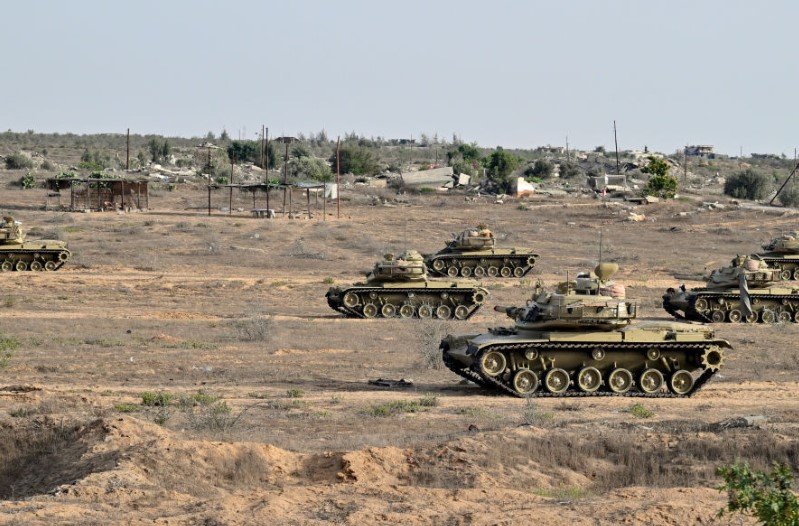Egypt has ramped up its military presence in the Sinai Peninsula as tensions with Israel reach a boiling point over the Gaza crisis. President Abdel Fattah El Sisi warned this week that the 1979 peace treaty could collapse if Israel pushes Palestinians toward Egypt’s border, marking a sharp escalation in rhetoric and actions between the two neighbors.
El Sisi’s Strong Words Signal Shift
At an Arab-Islamic summit in Qatar on September 16, 2025, President El Sisi openly called Israel an enemy for the first time in decades. He urged leaders not to let past peace efforts go to waste and hinted at scrapping the treaty if conditions in Gaza force mass displacement into Egypt.
This comes after months of growing criticism from El Sisi. He has accused Israel of genocide in Gaza and blocking aid, which has left millions in dire need. Recent reports show Egypt has ceased all security cooperation with Israel, refusing to explain military moves in Sinai.
El Sisi’s speech highlighted the risk of regret if the situation spirals. Analysts say this reflects Egypt’s frustration with Israel’s actions, including strikes that have killed thousands in Gaza since late 2023.
Massive Troop Buildup in Sinai
Egypt has deployed around 40,000 troops to Sinai, doubling the limit set by the 1979 peace accord. This move aims to secure the border amid fears of a Palestinian exodus from Gaza, where Israel has intensified operations.
Sources indicate the army is on its highest alert in years, with tanks, artillery, and anti-aircraft systems positioned near Rafah. Egypt views any forced movement of Palestinians as a direct threat to its national security.

This buildup follows Israel’s seizure of the Rafah crossing in May 2024, which Egypt called a treaty violation. Cairo has since fortified its side, building walls and buffer zones to prevent spillover.
The mobilization ties into broader regional unrest. Egypt has invited Hamas leaders to Cairo for protection, signaling a shift from past cooperation with Israel on security matters.
| Key Aspects of Sinai Mobilization | Details |
|---|---|
| Troop Numbers | Approximately 40,000 soldiers deployed |
| Equipment | Tanks, APCs, artillery, anti-aircraft systems |
| Locations | North Sinai, near Rafah and Gaza border |
| Purpose | Prevent Palestinian displacement, secure borders |
| Timeline | Started in August 2025, escalated in September |
Peace Treaty Under Strain
The 1979 Egypt-Israel peace treaty limits military forces in Sinai to maintain stability. Recent actions by both sides have tested these rules, with Israel raising concerns about Egypt’s expanded presence.
Israeli officials have asked for explanations and even sought U.S. intervention, as Washington helps uphold the accord. Egypt argues its moves are defensive, responding to Israel’s operations in Gaza and potential threats.
Public sentiment in Egypt has turned sharply against Israel. Protests in Cairo demand stronger action to support Palestinians, adding pressure on El Sisi.
Experts note that while the treaty has held for over 45 years, current events like the Gaza war could unravel it. Similar strains occurred in 2024 when Israel entered Rafah, prompting Egypt to boost forces without prior notice.
- Key treaty provisions include demilitarized zones in Sinai.
- Egypt claims self-defense rights amid Gaza crisis.
- Israel fears long-term military buildup near its border.
Implications for Regional Stability
A breakdown in Egypt-Israel relations could reshape Middle East dynamics. Egypt’s army, the region’s largest, might deter Israeli advances but risks wider conflict.
U.S. officials have urged calm, with talks in Cairo involving advisors like Jake Sullivan. Yet, Egypt’s invitation to Hamas leaders shows a bolder stance against Israeli aggression.
The Gaza situation remains critical, with over 40,000 reported deaths since October 2023. Egypt worries that Israel’s blockade could force Palestinians into Sinai, creating a humanitarian disaster.
This tension echoes past conflicts, but today’s context involves advanced weaponry and alliances. Iran’s potential support adds another layer of complexity.
Global Reactions and Next Steps
World leaders have called for restraint. The UN has warned of catastrophe if borders open to mass migration, while Arab nations back Egypt’s position.
In Israel, Prime Minister Benjamin Netanyahu has downplayed the rift but insisted on controlling Rafah to stop arms flow to Hamas. This has only fueled Egyptian anger.
Looking ahead, mediation efforts continue, but trust is low. Egypt demands guarantees that Israel won’t target exiled Hamas figures or push displacements.
As this story develops, readers should share their thoughts in the comments below. What do you think could ease these tensions? Your input helps spark important discussions.
